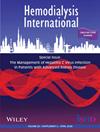Effects of pre-analytical sample care and analysis methodology on measures of metabolic acidosis in hemodialysis patients
Abstract
Introduction
We evaluated the effects of pre-analytical care on total carbon dioxide (tCO2) in hemodialysis patients, as calculated by blood gas analysis (ctCO2) or measured by an enzymatic assay (mtCO2).
Methods
Blood samples were collected via vascular access before dialysis sessions. For blood gas analysis, eight aliquots were collected, refrigerated or non-refrigerated, and analyzed at 0, 4, 8, and 24 h after collection. A blood sample was then collected for the enzymatic method and distributed into 14 aliquots. Half of the aliquots were refrigerated. The samples analyzed at time point 0 were centrifuged immediately. The remaining aliquots of both the refrigerated and non-refrigerated clusters were centrifuged before storage. Samples were analyzed at 4, 8, and 24 h post-collection.
Findings
By blood gas analysis, no significant change was found in bicarbonate values over time, either in the non-refrigerated or refrigerated samples. ctCO2 values during the experiment showed a minor but statistically significant increase of questionable clinical relevance in both non-refrigerated and refrigerated aliquots. In the enzymatic assay, the reduction in mtCO2 levels during the experiment was negligible. The median absolute reductions at the end of the experiment were 1.77, 1.21, 1.04, and 1.12 mmol/L for the non-centrifuged/non-refrigerated, centrifuged/non-refrigerated, non-centrifuged/refrigerated, and centrifuged/refrigerated aliquots, respectively.
Discussion
Our results suggest that measured or calculated tCO2 levels of capped and cooled samples are adequate for analyzing the acid–base status of hemodialysis patients, even when such determination is not performed immediately after collection.

 求助内容:
求助内容: 应助结果提醒方式:
应助结果提醒方式:


